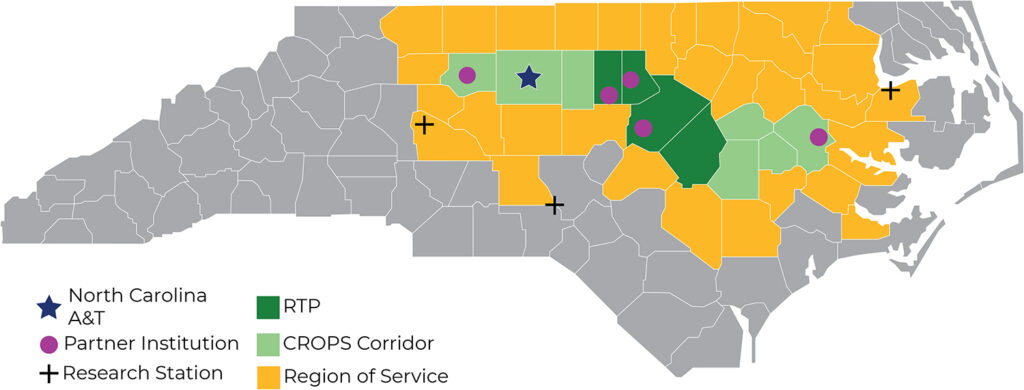Extension to Play Key Role in New “Ag Tech Corridor” Project
go.ncsu.edu/readext?994375
en Español / em Português
El inglés es el idioma de control de esta página. En la medida en que haya algún conflicto entre la traducción al inglés y la traducción, el inglés prevalece.
Al hacer clic en el enlace de traducción se activa un servicio de traducción gratuito para convertir la página al español. Al igual que con cualquier traducción por Internet, la conversión no es sensible al contexto y puede que no traduzca el texto en su significado original. NC State Extension no garantiza la exactitud del texto traducido. Por favor, tenga en cuenta que algunas aplicaciones y/o servicios pueden no funcionar como se espera cuando se traducen.
Português
Inglês é o idioma de controle desta página. Na medida que haja algum conflito entre o texto original em Inglês e a tradução, o Inglês prevalece.
Ao clicar no link de tradução, um serviço gratuito de tradução será ativado para converter a página para o Português. Como em qualquer tradução pela internet, a conversão não é sensivel ao contexto e pode não ocorrer a tradução para o significado orginal. O serviço de Extensão da Carolina do Norte (NC State Extension) não garante a exatidão do texto traduzido. Por favor, observe que algumas funções ou serviços podem não funcionar como esperado após a tradução.
English
English is the controlling language of this page. To the extent there is any conflict between the English text and the translation, English controls.
Clicking on the translation link activates a free translation service to convert the page to Spanish. As with any Internet translation, the conversion is not context-sensitive and may not translate the text to its original meaning. NC State Extension does not guarantee the accuracy of the translated text. Please note that some applications and/or services may not function as expected when translated.
Collapse ▲The NSF-funded CROPS project will build an ag tech corridor to speed the sharing of research-based techniques and new technologies with farmers, particularly underserved farmers, new farmers and those with small acreage.
[View full original article by Dee Shore at CALS News]
A $1 million grant from the National Science Foundation (NSF) is kickstarting an effort to create an agricultural technology corridor from central to eastern North Carolina.
The project brings together researchers from six North Carolina universities and county agents and specialists with N.C. Cooperative Extension with representatives of the N.C. Biotechnology Center, RTI International and the N.C. Community College System.
North Carolina State University is among the partners on the NSF-funded Regional Innovation Engines project led by N.C. A&T State University. Other partner universities are East Carolina, Duke and Wake Forest, as well as the University of North Carolina at Chapel Hill.
The project – called Climate-Responsive Opportunities in Plant Science, or CROPS – aims to expand efforts to share research-based techniques and new technologies, particularly those that can help lower barriers to market entry for limited-resource farmers so that they can succeed in the face of climate change and develop entrepreneurially.
This spring, the partners will begin working together to create a plan to develop a 42-county Agricultural Tech Innovation Corridor that will enable improvements in agriculture to reach underserved areas of the state faster.

N.C. PSI to lead NC State’s contributions
The N.C. Plant Sciences Initiative will lead NC State’s contributions to the project. The university’s principal investigator for the project is Ross Sozzani, professor of plant and microbial biology and N.C. PSI plant improvement platform leader. The university’s proposal development unit also plays a key role.
Other NC State faculty members co-leading different aspects of the project or serving on the governance board are:
- Adrian Percy, N.C. PSI director
- Rachel Vann, NC State Extension specialist and assistant professor of crop and soil sciences; N.C. PSI extension, outreach and engagement platform director
- Anders Huseth, NC State Extension specialist and associate professor of entomology and plant pathology
- Terri Long, professor of plant and microbial biology and N.C. PSI education and workforce development platform director
- Cranos Williams, Goodnight Distinguished Professor of Agricultural Analytics in electrical and computer engineering and plant and microbial biology; N.C. PSI data-driven plant sciences platform director
- Chris Reberg-Horton, NC State Extension specialist and professor of crop and soil sciences; N.C. PSI resilient agricultural systems platform director
Outreach will be central to the project, with a CROPS Extension Agent Network amplifying the project’s impact. The network will be modeled after the N.C. PSI’s Extension Agent Network, which Vann leads.
The CROPS program begins this spring with listening sessions across the state, and its programs are free to participants.

